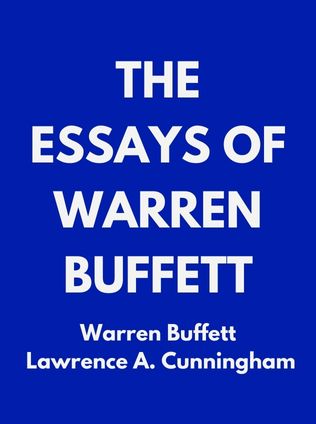
The Essays of Warren Buffett
Lessons for Corporate America
By Warren Buffett and Lawrence A. Cunningham
Published 01/1998
About the Author
Warren Buffett, often referred to as the "Oracle of Omaha," is one of the most successful investors in the world. Born in 1930 in Omaha, Nebraska, Buffett exhibited an early interest in business and investing, buying his first stock at the age of 11. His interest in numbers and finance led him to Columbia Business School, where he was deeply influenced by Benjamin Graham, the father of value investing. Graham’s principles, especially the concept of intrinsic value, would become the cornerstone of Buffett’s investment philosophy.
Buffett’s career is most closely associated with Berkshire Hathaway, a company he transformed from a struggling textile firm into one of the largest conglomerates in the world. His investment strategy is characterized by long-term investments in fundamentally strong companies, a focus on value over price, and a commitment to ethical business practices. Over the years, Buffett’s straightforward and transparent communication style, particularly through his annual letters to shareholders, has made him not just a financial icon but also a mentor to investors around the globe.
Main Idea
"The Essays of Warren Buffett," compiled by Lawrence A. Cunningham, offers a comprehensive look into Buffett’s investment philosophies, business strategies, and ethical viewpoints. The central theme of these essays is the importance of viewing stock ownership as akin to business ownership. Buffett stresses that investing should be approached with a long-term perspective, focusing on the intrinsic value of companies rather than getting caught up in market fluctuations or speculative trading.
Core Investment Principles
- Ownership Perspective: Buffett advises investors to think of themselves as owners of the businesses they invest in. This approach requires a deep understanding of the company’s operations, management, and long-term prospects.
- Intrinsic Value: The concept of intrinsic value is central to Buffett’s investment strategy. He emphasizes the importance of understanding a company’s true worth, which is determined by its ability to generate cash flow and profits over time.
- Long-Term Focus: Buffett advocates for a long-term investment strategy, where the goal is to buy quality companies and hold onto them as they grow and compound in value.
- Avoiding Speculation: Speculative trading, driven by market trends and the pursuit of short-term gains, is discouraged in favor of a disciplined approach based on research and fundamentals.
Table of Contents
- Introduction
- The Owner’s Manual
- Corporate Governance
- Finance and Investing
- Mergers and Acquisitions
- Accounting and Valuation
- Tax Matters
- Conclusion
1. Introduction
In the introduction, Buffett sets the tone by emphasizing the importance of aligning the interests of shareholders and management. He argues that a shareholder-oriented culture is essential for the long-term success of any company. Buffett’s approach to investing is grounded in the belief that shareholders should view themselves as part-owners of the business, which naturally leads to a focus on long-term results rather than short-term market fluctuations.
Buffett’s introduction serves as a manifesto for rational investing, encouraging shareholders to think like business owners. This perspective is crucial for understanding the essays that follow, as it frames the discussion around the idea that investing is not about quick gains but about building sustainable value over time.
2. The Owner’s Manual
The "Owner’s Manual" is one of the foundational pieces in Buffett’s collection of essays. It outlines the core philosophy that every shareholder of Berkshire Hathaway should adopt: seeing themselves as owners of the company. Buffett writes:
Sign up for FREE and get access to 1,400+ books summaries.
You May Also Like
Rich Dad Poor Dad
What the Rich Teach Their Kids About Money - That the Poor and Middle Class Do Not!
By Robert T. KiyosakiFreakonomics
A Rogue Economist Explores the Hidden Side of Everything
By Steven D. Levitt and Stephen J. DubnerThe Lean Startup
How Today's Entrepreneurs Use Continuous Innovation to Create Radically Successful Businesses
By Eric RiesWho Moved My Cheese?
An Amazing Way to Deal with Change in Your Work and in Your Life
By Spencer Johnson, M.D.Factfulness
Ten Reasons We're Wrong About the World – and Why Things Are Better Than You Think
By Hans RoslingMake Your Bed
Little Things That Can Change Your Life...And Maybe the World
By William H. McRaven



















